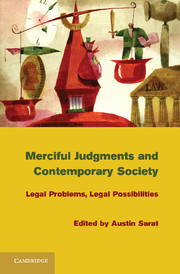Book contents
- Frontmatter
- Contents
- Acknowledgments
- Contributors
- When Can or Should Legal Judgment Be Merciful? An Introduction
- 1 The Place of Mercy in Legal Discourse
- Commentary on Chapter 1
- 2 Mercy, Crime Control, and Moral Credibility
- Commentary on Chapter 2
- 3 Defending a Role for Mercy in a Criminal Justice System
- Commentary on Chapter 3
- 4 Actions of Mercy
- Commentary on Chapter 4
- 5 A Feminist View of Mercy, Judgment, and the “Exception” in the Context of Transitional Justice
- Commentary on Chapter 5
- Index
- References
Commentary on Chapter 1
Response to "The Place of Mercy in Legal Discourse"
Published online by Cambridge University Press: 05 December 2011
- Frontmatter
- Contents
- Acknowledgments
- Contributors
- When Can or Should Legal Judgment Be Merciful? An Introduction
- 1 The Place of Mercy in Legal Discourse
- Commentary on Chapter 1
- 2 Mercy, Crime Control, and Moral Credibility
- Commentary on Chapter 2
- 3 Defending a Role for Mercy in a Criminal Justice System
- Commentary on Chapter 3
- 4 Actions of Mercy
- Commentary on Chapter 4
- 5 A Feminist View of Mercy, Judgment, and the “Exception” in the Context of Transitional Justice
- Commentary on Chapter 5
- Index
- References
Summary
Introduction
Robert Ferguson's contribution to this symposium seeks to bring discipline and precision to the debate over mercy's role in the legal system. He traces the origins of the modern concept to the ancient Roman philosophers Seneca and Marcus Aurelius, rejects religious conceptions of mercy as unworkable, corrects popular misunderstandings of Shakespeare's treatment of mercy in The Merchant of Venice and other plays, and notes that the U.S. Supreme Court has a bad tendency to confuse mercy with sympathy.
Ferguson also offers the outlines of a theory of mercy. In his view, mercy is a freestanding legal value. He rejects arguments that mercy is subordinate to, or incompatible with, punishment. He understands the power of mercy to smooth the rough edges of punishment and to avoid unjust results. At the same time he cautions that it is a volatile substance, something that must be handled with protective gloves to avoid undermining the system of criminal law. Most important, he argues that the exceptional nature of mercy requires that it be explained effectively and convincingly to all constituents of the polity.
- Type
- Chapter
- Information
- Merciful Judgments and Contemporary SocietyLegal Problems, Legal Possibilities, pp. 83 - 98Publisher: Cambridge University PressPrint publication year: 2011



